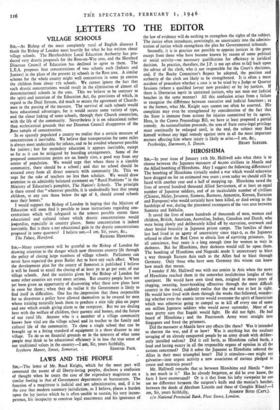LETTERS TO THE EDITOR
VILLAGE SCHOOLS
Sta,—As Bishop of the most completely rural of English dioceses I thank the Bishop of London most heartily for what he has written about village schools. The Herefordshire Local Education Authority has pro- duced very drastic proposals for the Ross-on-Wye area, and the Hereford Diocesan Council of Education has declined to agree to them. The L.E.A. proposes four concentrations of two schools each (Infants and Juniors) in the place of the present 25 schools in the Ross area. A similar scheme for the whole county might well concentrate in some 3o centres the children from about 17o schools. We cannot ignore the fact that such drastic concentrations would result in the elimination of almost all denominational schools in the area. This we believe to be contrary to the spirit and intention of the Education Act, the provisions of which, in regard to the Dual System, did much to secure the agreement of Church- men to the passing of the measure. The survival of such schools would have educational advantages, for it would secure some variety of type, and the closer linking of some schools, through their Church connection, with the life of the community. Nevertheless it is on educational rather than ecclesiastical grounds that our Diocesan Council disapproves of the Ross sample of concentration.
In so sparsely populated a county we realise that a certain measure of concentration is inevitable. We believe that transportation for some miles is always most undesirable for infants, and to be avoided whenever possible for juniors ; but for secondary education it appears inevitable, except so far as it can be mitigated by boarding arrangements. Some of the proposed concentration points are on lonely sites, a good way from any centre of population. We would urge that where there is a sizeable community, there should be a school ; and that no school should be situated away from all direct contacts with community life. This we urge for the sake of teachers no less than scholars. We would draw attention to an admirably balanced statement on " Rural Problems " in the Ministry of Education's pamphlet, The Nation's Schools. The principle is there stated that " wherever possible, it is undoubtedly best that young children, at any rate those below the age of 8, should attend schools near their homes."
I would support the Bishop of London in hoping that the Minister of Education will soon find it possible to issue instructions regarding con- centrations which will safeguard to the utmost possible extent those educational and cultural values which drastic concentrations would jeopardise, especially in country places. Some concentration is indeed inevitable. But is there a net educational gain in the drastic concentrations proposed in some quarters? I believe not.—I am, Sir, yours, &c.,


























 Previous page
Previous page